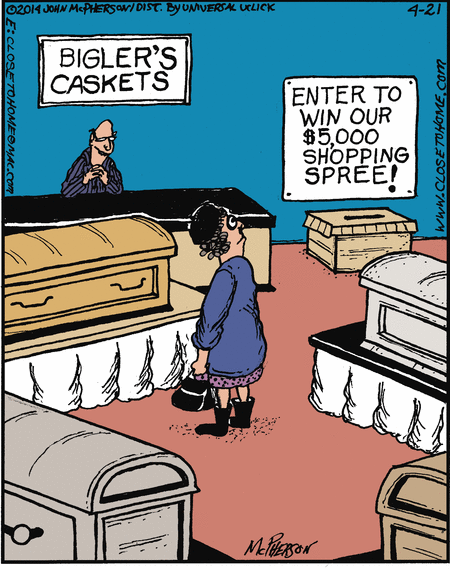The brouhaha over San Diego Clippers owner Donald Sterling took a bad turn for cartoonists yesterday when NBA Commissioner Adam Sterling hit him with a $2.5 million fine (the maximum allowed) and a lifetime ban from the league, meaning that, while they couldn't actually force him to sell the team, they could forbid him to have any interaction with it.
That crisp rustling sound you heard was of hundreds of cartoons being wadded up and tossed into the wastebasket.
Yes, it would be ironic if they hit the rim and bounced out.
It's impossible to know how many cartoons were drawn before Silver's announcement, but enough made it into syndication that it's reasonable to assume others didn't.
There were a couple of post-ruling fails as well, IMNSHO, from those who were upset that the league didn't do more, apparently not realizing that "flogging around the fleet" is no longer permitted, or disappointed that the commissioner, who has been in office since February 1, hadn't acted several years before gaining the position.
The best commentary came, as it happens, neither from cartoonist nor columnist but from Kareem Abdul Jabbar, who has the standing to address the topic and both the insight and the wit to make his opinion well worth reading. (That may be the most rewarding link you click on all week.)
However, not every cartoonist failed. A few didn't get beyond a somewhat tepid "Gee, he and Cliven Bundy could be friends!" level, but there were some who, like Kareem, took a longer view of things.
Jim Morin, for instance.
And Signe Wilkinson.
And Jen Sorensen, whose commentary is not only spot-on in addressing the larger issue of emerging racism, but gives me an excuse to announce that she's won yet another award.
Now, on the one hand, someone giving Jen Sorensen an award is starting to not feel like news anymore. I commented elsewhere that I suspect she's building herself a house made entirely of Lucite plaques.
But the Herblock Prize is not chopped liver, and you can read all about it on Michael Cavna's blog, where he also links to a profile of Sorensen elsewhere in WashPo.
My only quibble being that I really don't care that she's the first woman to ever win the Herblock. On a purely pragmatic level, she's only the 11th cartoonist to win the thing at all, and, given current male/female ratios in the trade, I don't know that a woman laureate was particularly overdue, and both she and Ann Telnaes have been the runner-up in prior years.
Though I didn't sit in on the judging, I highly doubt anyone voted for her in order to honor a woman. I cannot tell you how many times I have mentioned her here and then received a note from some well-regarded cartoonist saying that she's the best in the business, and I don't often get those for mentioning anyone else.
And not one of them ever added "best woman" or "best for a woman" or "despite being a woman."
What I like about her work is that she takes advantage of the extra edge permitted to those who labor in the alternative-press universe, but doesn't then waste it by showing off how far she can push things or by chasing off after little niche gripes.
By the latter, I mean that, for instance, her well-known, Lucite-recognized discussions of health care (here and then here) were not a millenial whine-tasting festival, but instead examined and illuminated the reality of the uninsured in terms that showed how the system affected one person, excluded from the system for economic reasons, in terms that derived their power by their universality, which you don't get with a "poor pitiful me" or even a "poor pitiful us" depiction.
That's not the result of a smart political decision. That's the result of a wise storytelling choice.
Storytellers, regardless of medium, begin with a fundamental choice: Either you go the Tom Clancy route, with a story so dramatic and overblown that technique becomes secondary to explosions, or you go for the John Updike approach and use technique to describe normal life in such a way that your character's experience becomes universal.
Yes, there are gradations and places to be in the middle. But those are the endpoints, and she's a lot closer to the end with the empathy than the one with the bombs.
And lest you think I'm too cynical about recognition, I'm very happy that she's been getting the kind of Lucite recently that comes with a check. (If you didn't realize that, Jen, I hope you haven't thrown out the boxes yet.)
Meanwhile, back at the funny pages
I don't know where this Adam@home arc is going, but yesterday's kick-off was so meta that I almost fell out of my chair, given that Rob Harrell (whose work I greatly admire) inherited the strip five years ago from the original creator, Brian Basset (whose work I greatly admire).
And one of my favorite on-line reruns is "Big Top," which features animals. I'm not sure the distinction between a circus and a carnival, but I'm damn sure that "Big Top" was created by Rob Harrell. And that it ... um ... it's over.
Yeah, this is an arc to watch.
And also
After a significant hiatus, Lost Side of Suburbia has kicked off another graphic novel.
One of the nice things about never getting around to editing my GoComics page is that some moribund choice will suddenly spring to life, and none more welcome than this. And I bring it to your attention because these stories go on for quite a while and can become quite involved, so you'll want to get in soon.






















